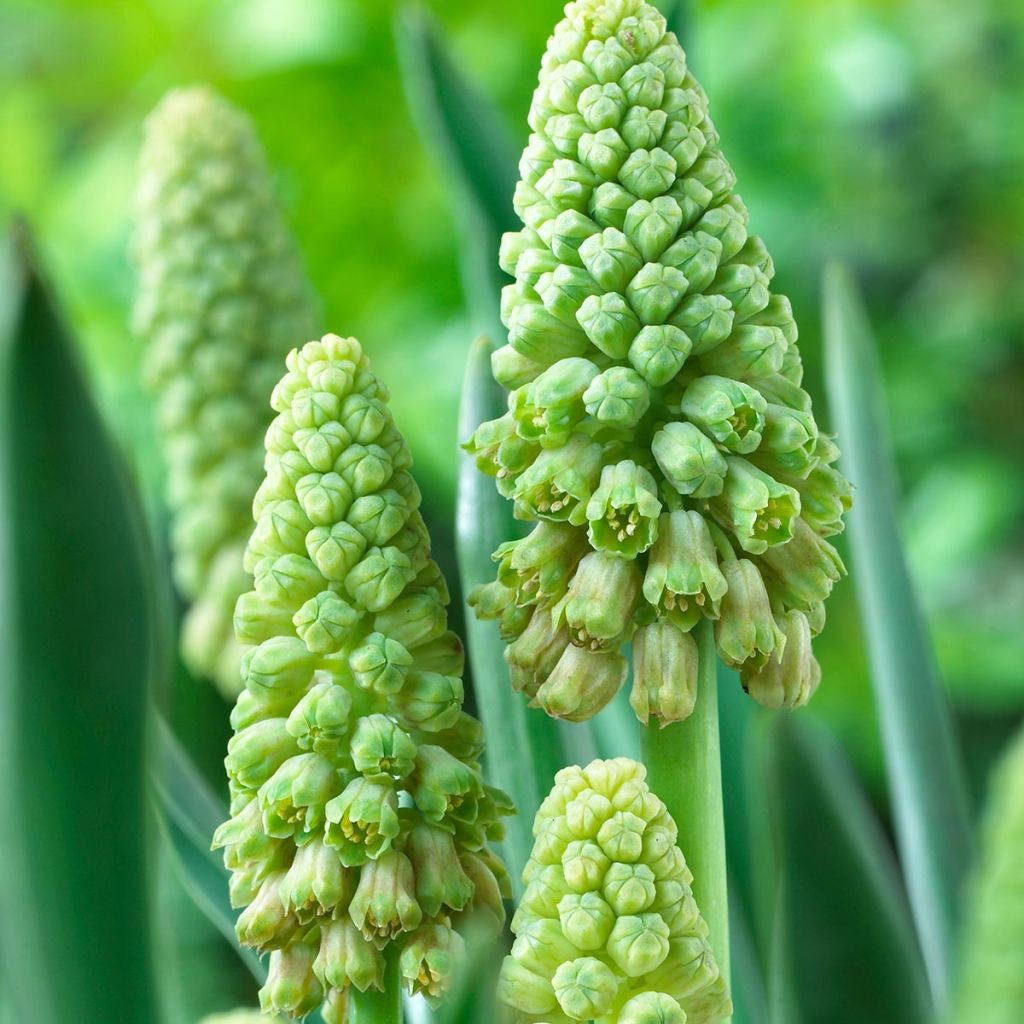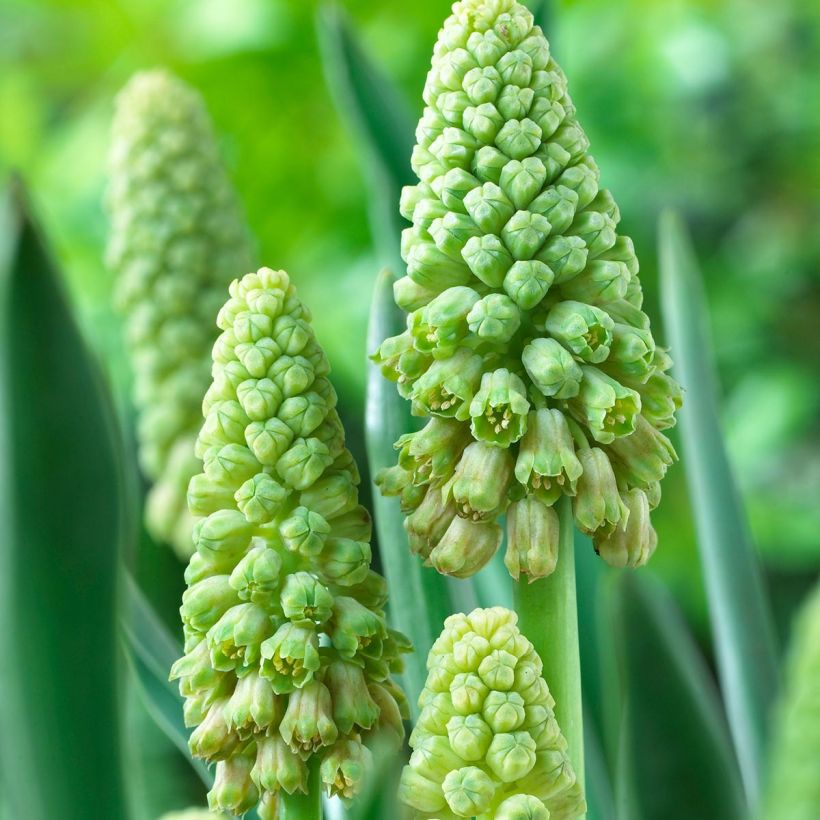

Bellevalia pycnantha Green Pearl - Muscari paradoxal
Bellevalia pycnantha Green Pearl
Bellevalia pycnantha Green Pearl
Roman Hyacinth, Roman Squill
Created on Oct 21, the flowering is coming to an end, I find the young plant not fully bloomed pleasant. But the colour fades a lot when it blooms and makes it dull.
Md, 04/04/2022
This plant carries a 6 months recovery warranty
More information
We guarantee the quality of our plants for a full growing cycle, and will replace at our expense any plant that fails to recover under normal climatic and planting conditions.
From €5.90 for pickup delivery and €6.90 for home delivery
Express home delivery from €8.90.
Does this plant fit my garden?
Set up your Plantfit profile →
Description
Bellavalia pycnantha Green Pearl (synonym B. paradoxa) is a rare bulbous plant in cultivation, but easy to grow as long as it benefits from a well-drained soil, preferably dry in summer. Similar to muscari and hyacinths, this lovely green-flowered form is also distinguished by the structure of its floral spikes and its larger flowers, which open like little bells. Like muscari, Bellavalia blooms in the heart of spring. It is a small hardy plant that requires being planted in a well-drained, rocky or sandy soil. The tender green turning to cream-white colour of its flowers pairs well with all the colours of the rainbow.
Bellavalia pycnantha, formerly known as Muscari paradoxum, is a bulbous plant belonging to the asparagaceae family and native to Turkey, found in the mountains of the Caucasus. It grows in sunny areas between rocks or in meadows, always in well-drained soil and under rather dry conditions in summer. Its cold resistance, under such growing conditions, is around -14°C (6.8°F) at its lowest.
In this Bellavalia paradoxa Green Pearl, root growth begins in late summer with the return of rain, and the foliage emerges from the ground during winter. The ribbon-like leaves are wider than those of the grape hyacinth, resembling tulip or hyacinth leaves, measuring 10 to 40 cm (4 to 16in) long and 0.6 to 1.5 cm (0.4 to 1in) wide. They have a slightly glaucous green colour. The flowering stems emerge slowly from the centre of the leaf clump in March-April, always remaining shorter than the foliage. The flowering period is long, lasting 25 days in April-May. The flower buds are compressed on a conical spike, similar to the Oriental hyacinth. They are dark blue and open from bottom to top, with small campanulate florets measuring 0.8 to 1.4 cm (0.5 to 1in) long. Their colour changes from dark blue to a lighter blue-violet, with a fine pale yellow-green edge. Bumblebees and bees are the pollinators of these flowers. The triangular-shaped fruits contain small round seeds. The entire vegetation dries up in June, while the bulb enters a dormant period for the entire summer, preferably in a dry state.
Bellavalia paradoxa is a rather rare plant that enriches the range of these small spring bulbs that all gardeners eagerly await. Once established, it multiplies spontaneously without becoming invasive. Hardy and drought-resistant, it can be used in various situations: at the base of deciduous trees with anemones, as a border to highlight the design of a pathway, in rockeries alongside botanical tulips and crocuses, or in raised beds with Siberian squills and small botanical daffodils.
Report an error about the product description
Bellevalia pycnantha Green Pearl in pictures


Plant habit
Flowering
Foliage
Botanical data
Bellevalia
pycnantha
Green Pearl
Asparagaceae (Liliaceae)
Roman Hyacinth, Roman Squill
Cultivar or hybrid
Planting and care
Plant your Bellevalia as soon as possible in a sufficiently well-drained soil, as they dislike excess moisture in both summer and winter. Loosen the soil deeply and mix it with gravel if necessary. Plant them at a depth of 12 cm (5in) (the bulbs should be covered with twice their height of soil). Space the bulbs 8 cm (3in) apart, making sure they do not touch each other. Choose a sunny exposure for better flowering. Planting at the base of deciduous trees and bushes is possible if the plants receive enough sunlight between October and March-April. Bellevalia is not very demanding in terms of soil type, which can be slightly acidic or slightly alkaline. Its hardiness is around -14°C (6.8°F) in well-drained soil.
Planting period
Intended location
Care
-
, onOrder confirmed
Reply from on Promesse de fleurs
Haven't found what you were looking for?
Hardiness is the lowest winter temperature a plant can endure without suffering serious damage or even dying. However, hardiness is affected by location (a sheltered area, such as a patio), protection (winter cover) and soil type (hardiness is improved by well-drained soil).

Photo Sharing Terms & Conditions
In order to encourage gardeners to interact and share their experiences, Promesse de fleurs offers various media enabling content to be uploaded onto its Site - in particular via the ‘Photo sharing’ module.
The User agrees to refrain from:
- Posting any content that is illegal, prejudicial, insulting, racist, inciteful to hatred, revisionist, contrary to public decency, that infringes on privacy or on the privacy rights of third parties, in particular the publicity rights of persons and goods, intellectual property rights, or the right to privacy.
- Submitting content on behalf of a third party;
- Impersonate the identity of a third party and/or publish any personal information about a third party;
In general, the User undertakes to refrain from any unethical behaviour.
All Content (in particular text, comments, files, images, photos, videos, creative works, etc.), which may be subject to property or intellectual property rights, image or other private rights, shall remain the property of the User, subject to the limited rights granted by the terms of the licence granted by Promesse de fleurs as stated below. Users are at liberty to publish or not to publish such Content on the Site, notably via the ‘Photo Sharing’ facility, and accept that this Content shall be made public and freely accessible, notably on the Internet.
Users further acknowledge, undertake to have ,and guarantee that they hold all necessary rights and permissions to publish such material on the Site, in particular with regard to the legislation in force pertaining to any privacy, property, intellectual property, image, or contractual rights, or rights of any other nature. By publishing such Content on the Site, Users acknowledge accepting full liability as publishers of the Content within the meaning of the law, and grant Promesse de fleurs, free of charge, an inclusive, worldwide licence for the said Content for the entire duration of its publication, including all reproduction, representation, up/downloading, displaying, performing, transmission, and storage rights.
Users also grant permission for their name to be linked to the Content and accept that this link may not always be made available.
By engaging in posting material, Users consent to their Content becoming automatically accessible on the Internet, in particular on other sites and/or blogs and/or web pages of the Promesse de fleurs site, including in particular social pages and the Promesse de fleurs catalogue.
Users may secure the removal of entrusted content free of charge by issuing a simple request via our contact form.
The flowering period indicated on our website applies to countries and regions located in USDA zone 8 (France, the United Kingdom, Ireland, the Netherlands, etc.)
It will vary according to where you live:
- In zones 9 to 10 (Italy, Spain, Greece, etc.), flowering will occur about 2 to 4 weeks earlier.
- In zones 6 to 7 (Germany, Poland, Slovenia, and lower mountainous regions), flowering will be delayed by 2 to 3 weeks.
- In zone 5 (Central Europe, Scandinavia), blooming will be delayed by 3 to 5 weeks.
In temperate climates, pruning of spring-flowering shrubs (forsythia, spireas, etc.) should be done just after flowering.
Pruning of summer-flowering shrubs (Indian Lilac, Perovskia, etc.) can be done in winter or spring.
In cold regions as well as with frost-sensitive plants, avoid pruning too early when severe frosts may still occur.
The planting period indicated on our website applies to countries and regions located in USDA zone 8 (France, United Kingdom, Ireland, Netherlands).
It will vary according to where you live:
- In Mediterranean zones (Marseille, Madrid, Milan, etc.), autumn and winter are the best planting periods.
- In continental zones (Strasbourg, Munich, Vienna, etc.), delay planting by 2 to 3 weeks in spring and bring it forward by 2 to 4 weeks in autumn.
- In mountainous regions (the Alps, Pyrenees, Carpathians, etc.), it is best to plant in late spring (May-June) or late summer (August-September).
The harvesting period indicated on our website applies to countries and regions in USDA zone 8 (France, England, Ireland, the Netherlands).
In colder areas (Scandinavia, Poland, Austria...) fruit and vegetable harvests are likely to be delayed by 3-4 weeks.
In warmer areas (Italy, Spain, Greece, etc.), harvesting will probably take place earlier, depending on weather conditions.
The sowing periods indicated on our website apply to countries and regions within USDA Zone 8 (France, UK, Ireland, Netherlands).
In colder areas (Scandinavia, Poland, Austria...), delay any outdoor sowing by 3-4 weeks, or sow under glass.
In warmer climes (Italy, Spain, Greece, etc.), bring outdoor sowing forward by a few weeks.


































